#Society
Dirty Da’wah [Part 2] – “The Satisfying” | Revenge In The Name Of Islam

Published

If da’wah is the beautiful call, then “Dirty Da’wah” is a vengeful sneer. In addition to tactics like insulting [see Dirty Da’wah Part 1 ] and manufacturing controversy, the production of “Satisfying” videos directed at Muslim audiences is Part 2 of this series on what’s rotten in the Muslim internet.
The word da’wah stems from the verb for invitation or calling in Arabic. The term da’ee refers to those who call others to Islam, whether they be Muslim or not.
A large amount of this “satisfying” content seems directed towards feelings of anger and helplessness in its Muslim audience. After all, the world is a cruel and difficult place for Muslims. How can we not feel angry when people insult our religion, misrepresent our Prophet ﷺ, curse our Lord and oppress our family in faith?
Keep supporting MuslimMatters for the sake of Allah
Alhamdulillah, we're at over 850 supporters. Help us get to 900 supporters this month. All it takes is a small gift from a reader like you to keep us going, for just $2 / month.
The Prophet (SAW) has taught us the best of deeds are those that done consistently, even if they are small. Click here to support MuslimMatters with a monthly donation of $2 per month. Set it and collect blessings from Allah (swt) for the khayr you're supporting without thinking about it.
When even the Prophet ﷺ sought comfort and consolation in hard times, it makes sense that we too seek to satisfy some sense of justice or comfort. The problem with this content is how it seeks to provide it- i.e. at the direct expense of others.
Often labeled “hilarious” or “entertaining,” videos like these allow the viewer to have a laugh at the non-Muslim getting “crushed,” “destroyed,” or “dismantled” by the da’ee. Many of them suggest a level of payback for the indignities suffered by the Muslim community, and in doing so, give their viewers a vicarious sense of justice served.
Seeking justice is an important cause for the entire Ummah, and until all of us are safe, the rest of us should remain restless for their cause. However, videos like these don’t serve justice as much as they dish out revenge.
Seeking justice for oppressed Muslims means fighting for their freedom, safety, and rights. Compare this to revenge, which better explains why some da’ees fight the people they are -ideally- inviting to Islam.
The following bright yellow images in this article are all composites of common -and actual- titles in these Dirty Da’wah videos, and there are many, many more like them.
“O believers! Do not insult what they invoke besides Allah or they will insult Allah spitefully out of ignorance. This is how We have made each people’s deeds appealing to them. Then to their Lord is their return, and He will inform them of what they used to do.” The Holy Qur’an, Surah Al An’am: 6;108]
Ridiculing And A Bit Racist
In one such video, a Muslim da’ee mocks the accent and grammar of a non-Muslim who speaks English as a second language, much to the amusement of the Muslims gathered around him. The video starts in the middle of what looks like da’wah gone horribly wrong. It begins with a non-Muslim angrily calling out to the Muslims gathered around him. They are crowded around him laughing as he is being mocked.
[Non Muslim]: “If you want to hear many times -”
[Da’ee]: “I have many hairs.”
[Non Muslim]: “I will hear-”
[Da’ee]: “You have hair, I have hair.”
[Non Muslim]: (gesturing with hand) “I will give you – I will give you this insight many times. Don’t follow the pagan religion.”
[Da’ee]: (gesturing with hand) “This in Hindi means I want to eat.”
[Non Muslim]: “Worship Jesus.”
[Da’ee]: (making hand gesture) “In Italian it means something else.”
[Video captioned by Da’ee to read: “It means WTF.”]
[Non Muslim]: “Allah is – Allah is fail.”
[Da’ee]: (interrupting) “Your English is fail.”
[Non Muslim]: “Allah is fail-“
[Da’ee]: (interrupting) “Your grammar is fail.”
[Non Muslim]: “Shame on you. Shame on you to be a encyclopedia here. Shame on you.”
[Da’ee]: (interrupting) “What’s an encyclopedia got to do with grammar?”
[Non Muslim]: “Shame on you to be a encyclopedia, correcting my English here.”
[Da’ee]: “Encyclopedia doesn’t correct English uncle.”
[Non Muslim]: “So shame on you by talking this. (scratches nose) So let me tell you-“
[Da’ee]: (interrupting) Don’t pick your nose. It’s unhygienic.”
Here the video ends, and the comments that follow can be broken down into four categories broadly:
- Praise for the video from other da’ees: “Loooooooooool I’m dead. This video would have been so boring without [Da’ee’s] edit style.”
- Praise from viewers: “Bro I loved your roasting skills,” “[Da’ee] is best in comedy.”
- Support for the behavior: “Warning: When you insult Allah
, Allah
will make a joke out of you lol.”
- Complaints from viewers about the da’ee’s poor manners.
- “SubhanAllah we shouldn’t be making fun of people like that. May Allah
guide us”
- “I would suggest to present everything as it is without laughter and jokes. Let the people judge who is wrong. Akhlaq (good character) is our weapon in such places. May Allah
guide us all.”
- “Salam, seen this video and wasn’t pleased with the behavior of our brothers… this guy may not know much about Islam and may criticize our faith, but if we retaliate with ridicule then it shines a negative light upon us as individuals or maybe so as an Ummah.”
- “…you guys are popular YouTubers and need to behave in such a way that our youths emanate your positive behaviors.. sorry to criticize especially publicly (don’t know how to send privately) but I felt that it could have been handled more sensibly. Best way to deal with situations like that is refer back to the Sunnah…”
- “SubhanAllah we shouldn’t be making fun of people like that. May Allah
So, What Would Our Prophet ﷺ Do?
Believe it or not, there are instances from the Sunnah in which a group of people are found mocking, ridiculing, and talking over someone in a deliberately disrespectful manner. It happened more often than you think, but this isn’t what the Prophet ﷺ did to debate with the Quraysh. This was what the Quraysh did to the Prophet ﷺ instead.
How much sense does it make to try and promote the message of the Prophet ﷺ with the same bullying tactics that were used against him? In what way is surrounding a non-believer with a group of hecklers any type of da’wah?
It’s not.
We have lessons from our Prophet ﷺ (as compared to his enemies) that give us very specific examples of how to respond to aggressive, disrespectful, or insulting non-Muslims. Story time!
Pray For Them, Even If They Hate You
Abu Jahl, in an evil little nutshell, was called the Fir’aun of Makkah. He beat and tortured people when they accepted Islam, especially those too weak, too poor, or too unimportant for others to protect. He tortured the sahabi husband and wife Yasir 



While Sumayya 
In spite of this, the Prophet 
The day after the Prophet 

“O Allah, strengthen Islam with Abu Jahl or Umar Ibn Al-Khattab.” – Tirmidhi
Yes, it was THAT Umar 
It was about this former enemy, oppressor, and heavy drinker that the Prophet 
Do Not Curse Them Back
When a group of Jewish residents in Madinah greeted the Prophet 


While the Prophet 



“And do not mind the disbelievers and the hypocrites. Ignore their harm and rely upon Allah. And sufficient is Allah as a Disposer of [your] affairs.” [The Holy Qur’an, Surah Al-Ahzab: 33;48]
Maintain Their Dignity, Even If They Offend Yours
Before converting to Islam, Urwa Ibn Masud was part of the Quraysh’s negotiation team at the Treaty of Hudaybiya. While he came to negotiate terms on their behalf, he was insulting and offensive to the Prophet 
On top of that, he reached out to grab the Prophet ﷺ by the beard, causing the companions around the Prophet 
“Repel [evil] by that [deed] which is better; and thereupon the one whom between you and him is enmity [will become] as though he was a devoted friend.” [The Holy Qur’an, Surah Fussilat: 41;34]
There are many, many more examples of the Prophet ﷺ taking the high road and never stooping to the level that he had been treated with. His entire character was that of honor, nobility, and dignity. So if the “satisfying,” videos of Muslims insulting and ridiculing non-Muslims aren’t from our Sunnah, then where are they coming from?
A Modern Muslim Misery – On Powerlessness And Frustration
“Revenge fantasies often serve to calm the negative feelings of frustration, humiliation, and insult by virtually punishing the perpetrator and settling the score between the victim’s suffering and the perpetrator’ actions1Haen C., Weber A. M. (2009). Beyond retribution: working through revenge fantasies with traumatized young people. Arts Psychother. 36, 84–93. 10.1016/j.aip.2009.01.005 [CrossRef] [Google Scholar].” (Haen and Weber, 2009).”
Numerous studies have shown positive associations between feelings of injustice and the desire for revenge. Given how much injustice Muslims face on a global basis – i.e. discrimination, occupation, genocide, invasion, oppression – we are bound to be outraged.
As justified as our anger can be, da’wah isn’t the place for us to act on it. Allah 
“And do not dispute with the followers of the Book except by what is best, except those of them who act unjustly, and say: We believe in that which has been revealed to us and revealed to you, and our Allah and your Allah is One, and to Him do we submit” [The Holy Qur’an, Surah Al-‘Ankabut: 29;46]
Scholars of tafseer have written on “what is best,” and in one brilliant example, Saeed Abu Ala Maududi writes:
“The discussion should be conducted rationally, in a civilized and decent language, so that the ideas of the other person may be reformed. The preacher’s chief aim should be to appeal to the addressee’s heart, convey the truth to him and bring him to the right path.
“He should not fight like a wrestler whose only object is to defeat his opponent. He should rather conduct himself like a physician who is ever cautious not to cause the patient’s ailment to worsen by any of his own mistakes, and tries to cure him with the least possible trouble.” [Tafseer Sayyid Abu Alaa Maududi]
Translation: Mind your manners. Don’t fight. Your job as a da’ee is to speak to the heart. Pretend you’re a doctor, and try to heal the heart without making things worse.
According to Ibn Katheer:
“What is meant here is that anyone who wants to find out about religion from them should argue with them in a manner that is better, as this will be more effective. Allah says: (Invite to the way of your Lord with wisdom and fair preaching…(Surah An-Nahl: 16;125))
And Allah
said to Musa
and Harun
when he sent them to Fir`awn: (And speak to him mildly, perhaps he may accept admonition or fear. (Surah Taha:20;44)” [Tafseer Ibn Kathir]
Translation: If you are going to teach people about Islam, be polite. That works better. God commanded Prophet Musa 
So if Allah 

There may be some who try to use the exception in this verse [“except those who act unjustly”] to justify mocking, insulting, and speaking harshly to non-Muslims in the course of their d’awah, but do “those who act unjustly” really include people who get snarky at da’wah booths?
So what does “acting unjustly” in this verse mean? Allah 
The noun itself – what the oppressor does – is defined as “wrong, iniquity, injustice, inequity, unfairness, oppression, repression, suppression, tyranny.”
So, if a person disagrees with your faith, interrupts you, calls you rude names, and makes fun of what you say – is that person an oppressor? Thank God they’re not, because lots of our da’ees would qualify for that label as well. Rude people are just rude people. Unless someone wrongs you, be civil or be quiet as Allah 

The Prophet (ﷺ) said, “He who believes in Allah and the Last Day must either speak good or remain silent.” Muslim, [Riyad As-Saaliheen]
If going to war seems a bit much for the people who yell at a da’wah booth, then you get the point. This verse of the Quran does not give Muslims the permission to verbally abuse non-Muslims, it gives us permission to go from words to swords if/when oppression happens and confrontation (versus civil discussion) is necessary to stop an ongoing injustice.
Our scholars have written extensively on how to interact with non-Muslims that we are calling to Islam. The gist of it is that we have good manners, gentle speech, and the best of intentions towards those we are addressing.
After all, the purpose of da’wah is not the victory of the da’ee, it is the betterment of the person being addressed. The “satisfying,” “hilarious,” and “entertaining” videos that position da’wah as a battle in which we fight dirty to win are missing the entire point.
Whoever strives for knowledge for the Hereafter
Obtains great gain in righteousness.
But he is in utter loss who seeks
To obtain advantage over people.
[Part 3 of this Dirty Da’wah series is coming soon to a MuslimMatters near you.]
Keep supporting MuslimMatters for the sake of Allah
Alhamdulillah, we're at over 850 supporters. Help us get to 900 supporters this month. All it takes is a small gift from a reader like you to keep us going, for just $2 / month.
The Prophet (SAW) has taught us the best of deeds are those that done consistently, even if they are small. Click here to support MuslimMatters with a monthly donation of $2 per month. Set it and collect blessings from Allah (swt) for the khayr you're supporting without thinking about it.
Zeba Khan is the Editor at Large - Special Needs for MuslimMatters.org, as well as a writer, speaker, and advocate for social justice. In addition to having a child with autism, she herself lives with Ehlers-Danlos Sydrome, Dysautonomia, Mast-Cell Activation Disorder, and a random assortment of acronyms that collectively translate to chronic illness and progressive disability. She is also an enthusiastic student of martial arts.


Faith, Identity, And Resistance Among Black Muslim Students

Moonshot [Part 12] – November Evans

From The Prophets To Karbala: The Timeless Lessons Of Ashura For Muslims Today

Moonshot [Part 11] – The Fig Factory

Nationalism And Its Kurdish Discontents [Part II of II]: Kurds And Turkiye After Ottoman Rule

Moonshot [Part 11] – The Fig Factory

Moonshot [Part 12] – November Evans

Moonshot [Part 10] – The Marco Polo

Moonshot [Part 9] – A Religion For Real Life

Nationalism And Its Kurdish Discontents [Part II of II]: Kurds And Turkiye After Ottoman Rule

[Dhul Hijjah Series] Calling Upon the Divine: The Art of Du’a (Part 1)

IOK Ramadan 2025: Four Steps | Sh Zaid Khan

IOK Ramadan 2025: Do Your Best | Sh Zaid Khan

IOK Ramadan 2025: Giving Preference to Others | Sh Zaid Khan


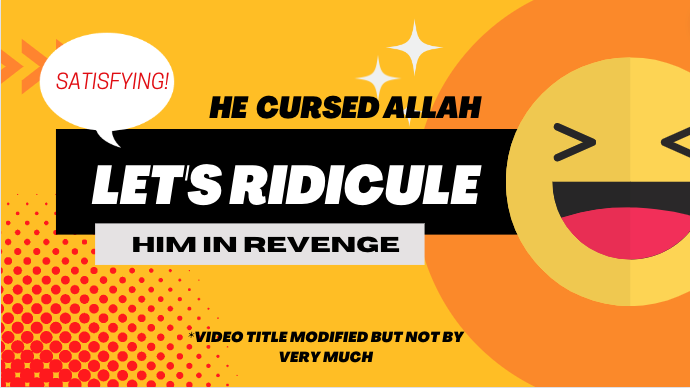
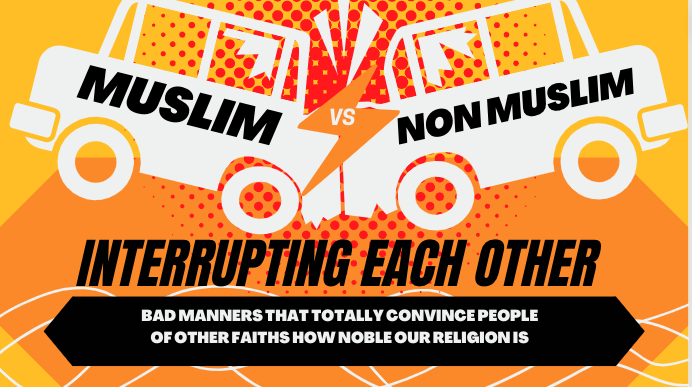
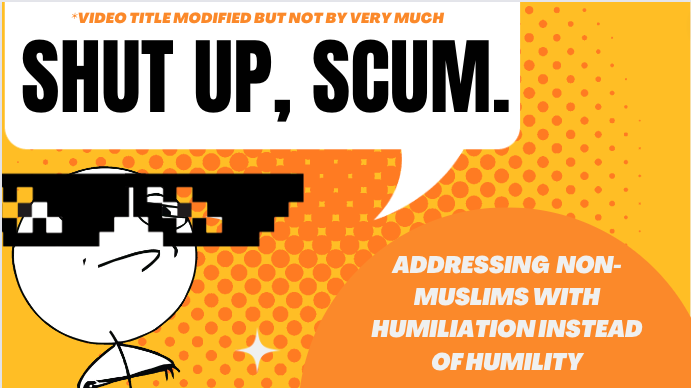

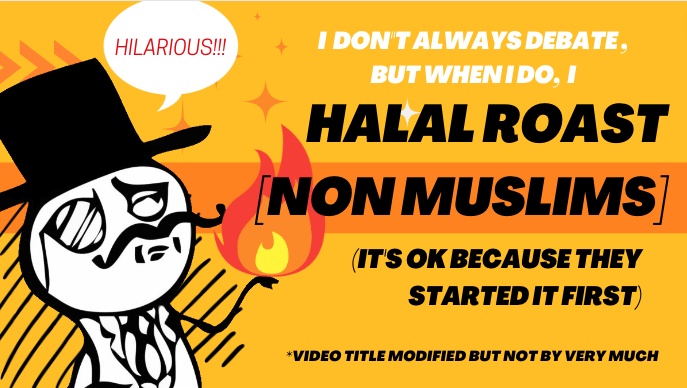
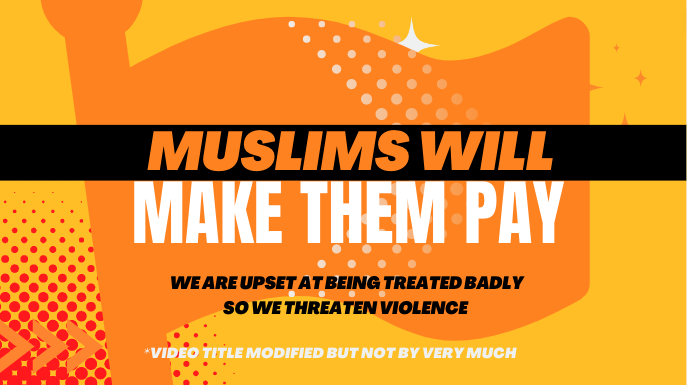
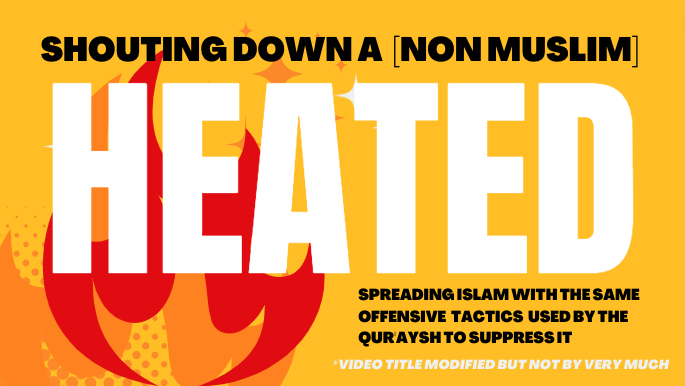
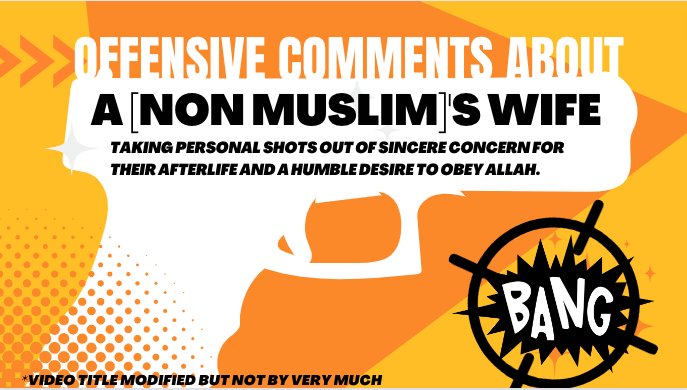



Sulaiman
November 15, 2022 at 8:23 AM
Our character should be like our Prophet (SAW). He was loving and respectful and did not insult anyone.
IrfanHasan
November 15, 2022 at 9:52 AM
Mashaa Allah. This is what I thought looking at social media today. Thank you so much for this relevant work in the 21st century.